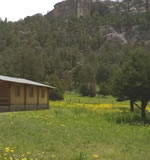Intended learning outcomes
The intended learning outcomes for the Forestry Sciences Engineering Study Programme are captured in the Study Plan itself, specifically in the graduate profile, which considers the following:
The graduate from the Forestry Sciences Engineering Education Programme of UJED will master the specific competences of her/his profession, in order to satisfy the needs of the sustainable managing of the forest sector.
She/he will know and be trained for modifying, innovating and applying modern technology in order to increase the sustainable production of the forest sector. At the same time, having a more integrated vision of the processes and levels presented in a forest.
Besides of being identified with the culture, education, mores, needs and organization forms of the communities settled in forest areas.
The generic competences that are sought to be developed are synthesized as follows:
- Seeking for the student to develop the capability of communicating in Spanish and in a second language, for her/his social interaction.
- That she/he applies the critical and self-critical thinking for identifying, posing and solving problems by means of the abstraction, analysis and synthesis processes.
- That she/he applies collaborative leadership to identify and develop ideas and/or projects in the professional and social field through the planning and making decisions processes, assuring team work, motivation and common target goals.
- That she/he acts with respect towards cultural diversity, with social responsibility and citizen commitment to face and solve professional conflicts.
- That she/he applies the suitable communication and information technologies as tools for solving the professional field and social problems which strengthen the development of learning, communicating, discipline training and investigation.
The specific or professional competences which are to be strengthened and that will provide the graduate with her/his own identity are the following:
- Forest Restoration: Designs, performs and assesses plans and programmes for the conservation and restoration of forest ecosystems guaranteeing their sustainability.
- Forest management: implements timber and non timber managing programmes, guaranteeing the sustainable use of forest resources attached to the regulations in force.
- Forest industries: Designs schemes for supplying, transformation and merchandising raw materials and forest products, in order to favor industrial processes without affecting the environment.
The graduates of the Forestry Sciences Engineering are strongly focused on the transformation processes of wood boards, sawmilling, drying and quality of products, pulp and paper industries; on forest management aiming to design, implementation and evaluation of plans and programmes for sustainable use, forest measurement for calculating productivity and on forest restoration, which implies the characterization, diagnosis and project development for improving and maintaining the diverse ecosystems, all of these supported by the use of Geographic Information Systems tools; but they are not focused on the design, construction and maintenance of heavy machinery sawmills, construction of roads and bridges, etc., as the usual English professional sense of the word “engineer” implies.
Formalities
For those who are processing Title or Professional Certificate
Institution code: 100001
Careers code:
Forestry Sciences Engineering: 305303






